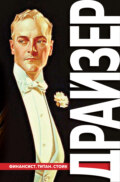
Теодор Драйзер
Финансист / The Financier
Just at this time his Uncle Seneca, again back in Philadelphia and stouter and more domineering than ever, said to him one day:
“Now, Frank, if you're ready for it, I think I know where there's a good opening for you. There won't be any salary in it for the first year, but they'll probably give you something as a gift at the end. Henry Waterman & Company might make a place for you as a bookkeeper.”
Uncle Seneca was married now, having, because of his wealth, attracted the attention of a poor but ambitious matron.
This offer of Uncle Seneca to get him in with Waterman & Company seemed to Frank quite reasonable. So he came to that organization at 74 South Second Street one day in June, and was cordially received by Mr. Henry Waterman. He looked him over critically. Yes, this boy might do, he thought. He would like to try.
“I like that fellow,” Henry Waterman confided to his brother the moment Frank had gone. “He's clean, brisk, and alive.”
“Yes,” said George, a much leaner and slightly taller man. “Yes, he's a nice young man. It's a wonder his father doesn't take him in his bank.”
“Well, he may not be able to,” said his brother. “He's only the cashier there.”
“That's right.”
“Well, we'll give him a trial. I bet anything he makes good.”
Something told him the boy would do well.
Chapter IV
The appearance of Frank Cowperwood at this time was prepossessing and satisfactory. He was about five feet ten inches tall. His head was large, shapely, his eyes were inscrutable. You could tell nothing by his eyes. He walked with a light, confident, springy step. He saw people richer than himself, but he hoped to be rich. His family was respected, his father well placed. He owed no man anything.
He turned out to be the most efficient clerk that the house of Waterman & Co. had ever known. They put him on the books at first as assistant bookkeeper, and in two weeks George said: “Why don't we make Cowperwood head bookkeeper?”
“All right, make the transfer, George, but he won't be a bookkeeper long, though.”
The books of Messrs. Waterman & Co were child's play to Frank. He went through them with an ease and rapidity which surprised his erstwhile superior, Mr. Sampson.
“Why, that fellow,” Sampson told another clerk on the first day he had seen Cowperwood work, “he's too brisk. He s going to make a bad break.[23] I know that kind. Wait a little bit.”
But the bad break Mr. Sampson anticipated did not materialize. In less than a week Cowperwood knew the financial condition of the Messrs. Waterman very well. He knew how their accounts were distributed; from what section they drew the most business; who sent poor produce and good. Bookkeeping did not interest him much. He knew he would not do this long.
The Watermans, Henry and George, were greatly pleased with the way he handled their accounts. There was a sense of security in his very presence. He soon began to call George's attention to the condition of certain accounts, making suggestions as to their possible liquidation or discontinuance.
One morning, when bills indicated a probable glut of flour and a shortage of grain, the elder Waterman called him into his office and said:
“Frank, I wish you would see what you can do with this condition that confronts us. By tomorrow we're going to be overcrowded with flour. We can't be paying storage charges. We're short on grain. Maybe you could trade out the flour to some of those brokers and get me enough grain to fill the orders.”
“I'd like to try,” said his employee.
Frank knew from his books where the various commission-houses were. He knew the local merchants and the various commission-merchants. This was the thing he liked to do. It was pleasant to be out in the air again. He objected to desk work and pen work and poring over books. As he said in later years, his brain was his office. He hurried to the principal commission-merchants, offering his surplus. Did they want to buy for immediate delivery six hundred barrels of prime flour? He would offer it at nine dollars straight, in the barrel. They did not. He offered it in fractions, and some agreed to take one portion, and some another. In about an hour he had one lot of two hundred barrels, which he decided to offer to a famous operator named Genderman[24] with whom his firm did no business. The latter, a big man with curly gray hair and little eyes looked at Cowperwood curiously when he came in.
“What's your name, young man?” he asked, leaning back in his wooden chair.
“Cowperwood.”
“So you work for Waterman & Company? You want to make a record[25], no doubt. That's why you came to me?”
Cowperwood merely smiled.
“Well, I'll take your flour. I need it.”
Cowperwood hurried out. He went direct to a firm of brokers in Walnut Street, with whom his firm dealt. Then he returned to the office.
“Well,” said Henry Waterman, when he reported, “you did that quick. You sold old Genderman two hundred barrels direct, did you? That's doing pretty well. He isn't on our books, is he?”
“No, sir.”
“I thought not. Well, if you can do that sort of work you won't be on the books long.”
Soon Frank became a familiar figure in the commission district and on the Produce Exchange, soliciting new customers and breaking gluts. Indeed the Watermans were astonished at his facilities. He had an uncanny faculty for making friends and being introduced into new realms. New life began to flow through the old channels of the Waterman company. Their customers were satisfied. George was for sending him out into the rural districts to drum up trade[26], and this was eventually done.
Near Christmas-time Henry said to George:
“We'll have to make Cowperwood a present. He hasn't any salary. How about five hundred dollars?”
“I guess he's worth it. He's certainly done everything we've expected, and more. He's cut out for this business.”
“What does he say about it? Do you ever hear him say whether he's satisfied?”
“Oh, he likes it pretty much, I guess.”
“Well, that fellow has the real knack for this business.”
So the night before Christmas, as Cowperwood was looking over some way-bills[27] and certificates, George Waterman came to his desk.
“My brother and I have been especially pleased with the way you have handled the work here during the past six months. We wanted to make some acknowledgment, and we thought about five hundred dollars. From January we'll give you a regular salary of thirty dollars a week.”
“I'm certainly much obliged to you,” said Frank. “I didn't expect that much. I've learned much here.”
“Oh, don't mention it. We know you've earned it. You can stay with us as long as you like. We're glad to have you with us.”
Cowperwood smiled his hearty, genial smile. He was feeling very comfortable under this evidence of approval.
On the way home that evening he was thinking about that business. He knew he wasn't going to stay there long, even in spite of this gift and promise of salary. They were grateful, of course; butwhy shouldn't they be? He was efficient, he knew that.
After dinner that evening, Frank told his father of the gift of five hundred dollars and the promised salary.
“That's splendid,” said his father. “You're doing better than I thought. I suppose you'll stay there.”
“No, I won't. I think I'll quit sometime next year.”
“Why?”
“Well, it isn't exactly what I want to do. It's all right, but I'd rather try my hand[28] at brokerage, I think. That appeals to me.”
“Don't you think you are doing them an injustice not to tell them?”
“Not at all. They need me.”
He straightened his tie and adjusted his coat.
“Have you told your mother?”
“No. I'm going to do it now.”
He went out into the dining-room, where his mother was, and slipping his arms around her little body, said:
“What do you think, Mammy?”
“Well, what?” she asked, looking affectionately into his eyes.
“I got five hundred dollars tonight, and I get thirty a week next year. What do you want for Christmas?”
“You don t say![29] Isn't that nice! Isn't that fine! They must like you.”
“What do you want for Christmas?”
“Nothing. I don't want anything. I have my children.”
He smiled.
“All right. Then nothing it is.”
But she knew he would buy her something.
He went out, pausing at the door to grab playfully at his sister's waist, and saying that he'd be back about midnight, hurried to Marjorie's house, because he had promised to take her to a show.
“Anything you want for Christmas this year, Margy?” he asked, after kissing her. “I got five hundred tonight.”
She was an innocent little thing, only fifteen, no guile, no shrewdness.
“Oh, you needn't get me anything.”
“Needn't I?” he asked, squeezing her waist and kissing her mouth again.
It was fine to have such a good time.
Chapter V
The following October, feeling sure that he would never do with the grain and commission business as conducted by the Waterman Company, Cowperwood decided to sever his relations with them and enter the employ of Tighe & Company, bankers and brokers.
Cowperwood's meeting with Tighe & Company had come some weeks ago. Mr. Tighe took a keen interest in this subtle young emissary.
“How's business with you people?” he would ask.
Because of the unsettled condition of the country, the over-inflation, the slavery agitation[30], and so forth, there were prospects of hard times.
“Oh, things are going pretty well with us, thank you, Mr. Tighe,” Cowperwood would answer.
“I tell you,” he said to Cowperwood one morning, “this slavery agitation, if it doesn't stop, is going to cause trouble.”
“It's coming, I think,” said Cowperwood, quietly. “It can't be healed, in my judgment. The negroes aren't worth all this excitement, but they'll go on agitating for them—emotional people always do this. They haven't anything else to do. It's hurting our Southern trade.”
“I thought so. That's what people tell me.”
Mr. Tighe turned to a new customer as young Cowperwood went out, but again the boy struck him as being deep-thinking on financial matters.
“If that young fellow wanted a place, I'd give it to him,” he thought.
Finally, one day he said to him:
“How would you like to try your hand at being a floor man for me? I need a young man here. One of my clerks is leaving.”
“I'd like it,” replied Cowperwood, smiling and looking intensely gratified. “I had thought of speaking to you myself some time.”
“Well, if you're ready, the place is open. Come any time you like.”
“Would you mind waiting a week or two?” Cowperwood said, quietly.
“Of course, come as soon as you can. I don't want to inconvenience your employers.”
It was only two weeks later that Frank took his departure from Waterman & Company. Mr. George Waterman's grief was great. As for Mr. Henry Waterman, he was actually irritated by this defection.
“Why, I thought,” he exclaimed, vigorously, when informed by Cowperwood of his decision, “that you liked the business. Is it a matter of salary?”
“No, not at all, Mr. Waterman. I just want to get into the brokerage business.”
“Well, that certainly is too bad. I'm sorry. I don't want to urge you against your own best interests. You know what you are doing. Why, damn it, man, there's good money in this business.”
“I know it,” smiled Cowperwood, “but I don't like it. I have other plans. I'll never be a grain and commission man.”
Mr. Henry Waterman could scarcely understand why obvious success in this field did not interest him.
Cowperwood's new work was more suited to him in every way—as easy and more profitable, of course. In the first place, the firm of Tighe & Co., unlike that of Waterman & Co., was located in a handsome green-gray stone building at 66 South Third Street, in what was then the heart of the financial district. Great institutions of national and international import and repute were near at hand—Drexel & Co., Edward Clark & Co., the Third National Bank, the First National Bank, the Stock Exchange, and similar institutions. Almost a score of smaller banks and brokerage firms were also in the vicinity. Edward Tighe, the head and brains of this concern, was a Boston Irishman, the son of an immigrant who had flourished and done well in that conservative city. He was not very stout, slightly and prematurely gray. His upper lip was ornamented by a short, gray mustache.
Chapter VI
The Cowperwood family was by this time established in its new and larger and more tastefully furnished house on North Front Street, facing the river.
Their company was not very distinguished, but it included a number of people who were successful—heads of small businesses, dealers in dry-goods[31], leather, groceries (wholesale), and grain.
And during the first year of the new life in this house Frank met a certain Mrs. Semple[32], who interested him greatly. Her husband had a big shoe store on Chestnut Street, and was planning to open a second one farther out on the same street.
Lillian Semple caught and held Frank's interest. Why? It would be hard to say, for she was really not suited to him emotionally, intellectually, or otherwise. He was not without experience with women or girls, and still held a tentative relationship with Marjorie Stafford; but Lillian Semple, in spite of the fact that she was married, seemed not wiser and saner, but more worth while. She was twenty-four as opposed to Frank's nineteen, but still young enough in her thoughts. She was slightly taller than he. Her hair was the color of a dried English walnut, rich and plentiful, her eyes varied from gray to blue and from gray to brown, according to the light in which you saw them. Her hands were thin, her nose straight, her face artistically narrow. She was not brilliant, not active, but rather peaceful and statuesque without knowing it. Cowperwood was carried away by her appearance. She was lovely, he thought—gracious, dignified. If he could have his choice of a wife, this was the kind of a girl he would like to have.
Cowperwood's judgment of women was temperamental rather than intellectual. Homely woman meant nothing to him. And the passionate woman meant much. He preferred to think of people—even women—as honestly, frankly self-interested. He could not have told you why. He wanted contact which was intimate, subtle, individual, personal.
So came Lillian Semple, who was nothing more to him than the shadow of an ideal. His thoughts continued to dwell on her, notwithstanding the hectic days which now passed like flashes of light in his new business venture. For this stock exchange world in which he now found himself, was most fascinating to Cowperwood.
Young Cowperwood would not have been admitted at all, as either a broker or broker's agent or assistant, except that Tighe, feeling that he needed him and believing that he would be very useful, bought him a seat on 'change—charging the two thousand dollars it cost as a debt and then ostensibly taking him into partnership. Cowperwood was put under the direction of Mr. Arthur Rivers[33], the regular floor man[34] of Tighe & Company.
Rivers was an exceedingly forceful man of thirty-five, well-dressed, well-formed, with a hard, smooth, evenly chiseled face, which was ornamented by a short, black mustache and fine, black, clearly penciled eyebrows. His chin was faintly and attractively cleft. He had a soft voice, and a quiet, conservative manner. Cowperwood wondered at first why Rivers should work for Tighe, but afterward learned that Tighe was the organizer, Rivers the floor and outside man[35].
It was useless, as Frank soon found, to try to figure out exactly why stocks rose and fell. Some general reasons there were, of course, as he was told by Tighe, but they could not always be depended on.
“Sure, anything can make or break a market,” Tighe explained. “It's a most unusual world, Cowperwood. No man can explain it. I've seen breaks in stocks that you could never explain at all—no one could. It wouldn't be possible to find out why they broke. I've seen rises the same way. My God, the rumors of the stock exchange! Ask Rivers to show you everything. Don t you ever lose for me[36], though. That's the cardinal sin in this office.” He grinned maliciously.
Cowperwood understood. This subtle world appealed to him. It answered to his temperament.
There were rumors, rumors, rumors—of great railway and street-car undertakings, land developments, government revision of the tariff, war between France and Turkey, famine in Russia or Ireland, and so on. The first Atlantic cable had not been laid as yet, and news of any kind from abroad was slow and meager.
Frank soon understood the situation. A “bull,” he learned, was one who bought in anticipation of a higher price to come. He sold to “realize” his profit, or if his margins were exhausted he was “wiped out.” A “bear” was one who sold stocks which most frequently he did not have, in anticipation of a lower price, at which he could buy and satisfy his previous sales. And so on.
He smiled at first at the air of great secrecy and wisdom on the part of the younger men. They were so heartily and foolishly suspicious. The older men, as a rule, were inscrutable. They pretended indifference, uncertainty. Snap! and the opportunity was gone. Somebody else had picked up what you wanted. All had their little note-books.
A gong sounded the call to trading at ten o'clock, and fifty to a hundred men would shout, gesticulate, shove here and there; endeavoring to take advantage of the stock offered or called for.
“Five-eighths for five hundred P. and W.,” some one would call—Rivers or Cowperwood, or any other broker.
“Five hundred at three-fourths,” would come the reply from someone else, who either had an order to sell the stock at that price. The professional traders were, of course, keen students of psychology; and their success depended on their ability to guess whether or not a broker representing a big manipulator, like Tighe, had an order large enough to affect the market sufficiently to give them an opportunity to “get in and out[37],” as they termed it, at a profit before he had completed the execution of his order. They were like hawks watching for an opportunity to snatch their prey from under the very claws of their opponents.
Distorted faces were shoved over shoulders or under arms. The most ridiculous grimaces were purposely or unconsciously indulged in. At first it seemed quite a wonderful thing to young Cowperwood, for he liked human presence and activity; but a little later he came down to a clearer sense of the intricacies of the problem before him. Buying and selling stocks, as he soon learned, was an art, a subtlety, almost a psychic emotion. Suspicion, intuition, feeling—these were the most important things there.
Yet in time he also asked himself, who was it who made the real money—the stock-brokers? Not at all. Some of them were making money, but they were, as he quickly saw, like a lot of gulls or stormy petrels, hungry and anxious to snap up any unwary fish. Back of them were other men, men with shrewd ideas, subtle resources. Men of immense means whose enterprise and holdings these stocks represented, the men who schemed out and built the railroads, opened the mines, organized trading enterprises, and built up immense manufactories. They might use brokers or other agents to buy and sell on change. These men were gamblers. He was nothing more than a gambler's agent. It was not troubling him any just at this moment, but it was not at all a mystery now, what he was. A man, a real man, must never be an agent, a tool, or a gambler—acting for himself or for others—he must employ such. A real man—a financier—was never a tool. He used tools. He created. He led.
Clearly, very clearly, at nineteen, twenty, and twenty-one years of age, he saw all this, but he was not quite ready yet to do anything about it. He was certain, however, that his day would come.






